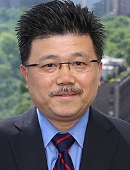Transcription Mechanism and Drug Discovery
The Zhou Lab investigates how genes are switched on and off within chromatin—the tightly packed structure that organizes the genome. Their research has led to major breakthroughs in understanding how DNA-packaging histone proteins regulate gene activity. In a landmark Nature (1999) study, Dr. Zhou and colleagues determined the first three-dimensional structure and function of the Bromodomain—a conserved protein module that recognizes acetyl-lysine on histones. This discovery revealed how cells "read" histone modifications to control gene expression and directly inspired the influential "histone code" hypothesis proposed by C. David Allis in 2000.
The Zhou Lab’s work resolved a long-standing question in biology, first posed by Vincent Allfrey in 1964: How does histone acetylation influence gene activity? They demonstrated that acetylation not only loosens DNA-histone interactions, but also recruits transcriptional regulators that modulate gene expression. This bromodomain-acetylation recognition mechanism is now known to play central roles in gene regulation, DNA repair, cell division, and other essential cellular processes.
Through structure-guided studies, The Zhou Lab has uncovered fundamental principles by which cells interpret histone "tags" to fine-tune gene expression. Key findings include:
• How bromodomain proteins organize chromatin structure and recruit gene-regulatory complexes to ensure faithful cell lineage differentiation (Mol. Cell, 2002, 2004, 2017);
• How combinations of histone modifications dictate gene activation or repression (Mol. Cell, 2007, 2010; Nature Struct. & Mol. Biol., 2008, 2020; Nature, 2010);
• How distinct chemical modifications on the same histone residue can produce divergent gene expression outcomes (Mol. Cell, 2023).
Dr. Zhou also pioneered the use of small molecules to modulate bromodomain-histone interactions—enabling pharmacological control of gene expression (JACS, 2005, 2011; JMC, 2012, 2013; Cancer Cell, 2014, 2015; PNAS, 2017, 2018). This work laid the foundation for a new class of bromodomain-targeted epigenomic therapies, now in the development for cancer, autoimmune disorders, and Alzheimer’s disease (Nature Reviews Drug Discovery, 2025).
Selected Publications
Zhou, M.-M., & Cole, P.A. (2025) Targeting Lysine Acetylation Readers and Writers. Nature Reviews Drug Discovery, 24(2):112-133.
Vann, K.R., Sharma, R., Hsu, C.-C., Devoucoux, M., Tencer, A.H., Zeng, L., Lin, K., Zhu, L., Li, Q., Lachance, C., Ospina, R.R., Tong, Q., Cheung, K.L., Yang, S., Xuan, H., Gatchalian, J., Alamillo, L., Wang, J., Jang, S.M., Klein, B.J., Lu, Y., Strahl, B.D., Rothbart, S.B., Walsh, M.J., Cleary, M.L., Côté, J., Shi, X., Zhou, M.-M.*, & Kutateladze, T.G.* (2025) Structure-Function Relationship of ASH1L and Histone H3K26 and H3K4 Methylation. Nature Commun., 16(1): 2235. PMID: 40044670.
Liu, N., Konuma, K., Sharma, R., Wang, D., Zhao, N., Cao, L.L., Ju, Y., Liu, D., Wang, Shui, Bosch, A., Sun, Y.F., Zhang, S., Ji, D.L., Nagatoishi, S., Suzuki, N., Kikuchi, M., Wakamori, M., Zhao, C.C., Ren, C.Y., Zhou, T.J.C., Xu. Y.Y., Meslamani, J., Fu, S.B., Umehara, T., Tsumoto, K., Akashi, S., Zeng, L., Roeder, R.G., Walsh, M.J., Zhang, Q., & Zhou, M.-M. (2023) Histone H3 Lysine 27 Crotonylation Mediates Gene Transcriptional Repression in Chromatin. Mol. Cell 83(13): 2206-2221.
Yu, D., Liang, Y., Kim, C., Jaganathan, A., Ji, D., Han, X., Yang, X., Jia, Y., Gu, R., Wang, C., Zhang, Q., Cheung, K.L., Zhou, M.-M., & Zeng, L. (2023) Structural Mechanism of BRD4-NUT and p300 Bipartite Interactions in Propagating Aberrant Gene Transcription in Chromatin in NUT Carcinoma. Nature Commun. 14(1): 378.
Han, X.Y., Yu, D., Gu, R.R., Jia, Y.J., Wang, Q., Yang, X.L., Yu, M.M., Babault, N., Zhao, C.C., Yi, H.F., Zhang, Q., Zhou, M.-M., & Zeng, L. (2020) Roles of BRD4 Short Isoform in Phase Separation for Active Gene Transcription. Nature Struct. & Mol. Biol., 27(4):333-341.
Shi, J., Wang, Y., Zeng, L., Wu, Y., Deng, J., Zhang, Q., Dong, C., Li, J., Rusinova, E., Zhang, G., Wang, C., Zhu, H., Evers, B.M., Zhou, M.-M.*, & Zhou, B.P.* (2014) Disrupting the Interaction of BRD4 with Diacetylated Twist Suppresses Tumorigenesis in Basal-like Breast Cancer. Cancer Cell 25(2): 210-225.
Yap, K.L., Li, S., Munoz-Cabello, A.M., Raguz, S., Zeng, L., Mujtaba, S., Gil, J., Walsh, W.J., & Zhou, M.-M. (2010) Molecular Interplay of the Non-coding RNA ANRIL and Methylated Histone H3 Lysine 27 by Polycomb CBX7 in Transcriptional Silencing of INK4a. Mol. Cell 38(5): 662-674.
Zeng, L., Zhang, Q., Li, S.D., Plotnikov, A.N., Walsh, M.J., & Zhou, M.-M. (2010) Mechanism and Regulation of Acetylated Histone Binding of the Tandem PHD Finger of DPF3b. Nature 466(7303): 258-62.
Zeng, L., Li, J., Muller, M., Yan, S., Mujtaba, S., Pan, C., Wang, Z., & Zhou, M.-M. (2005) Selective Small Molecules Blocking HIV-1 Tat and Coactivator PCAF Association. Journal of Am. Chem. Soc. 127(8): 2376-2377.
Dhalluin, C., Carlson, J., Zeng, L., He, C., Aggarwal, A.K., & Zhou, M.-M. (1999) Structure and Ligand of a Histone Acetyltransferase Bromodomain. Nature 399(6735): 491-496.
